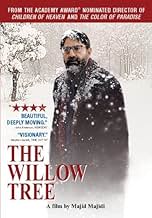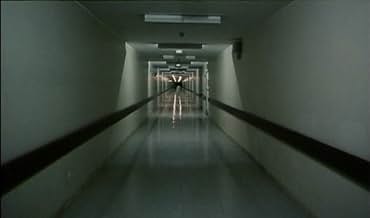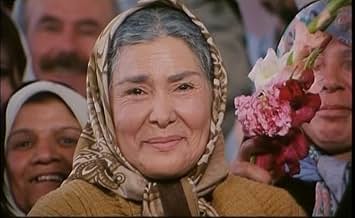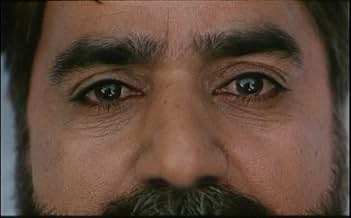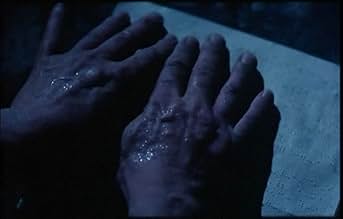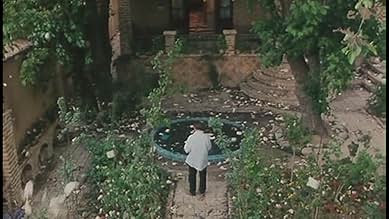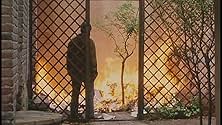IMDb-BEWERTUNG
7,3/10
4639
IHRE BEWERTUNG
Füge eine Handlung in deiner Sprache hinzuYoussef, a blind university professor, is suddenly diagnosed with a fatal disease and must undergo treatment in France. Back home, will he find the life he had before?Youssef, a blind university professor, is suddenly diagnosed with a fatal disease and must undergo treatment in France. Back home, will he find the life he had before?Youssef, a blind university professor, is suddenly diagnosed with a fatal disease and must undergo treatment in France. Back home, will he find the life he had before?
- Auszeichnungen
- 2 Gewinne & 2 Nominierungen insgesamt
Soghra Obeisi
- Aziz
- (as Afarin Obeisi)
Leila Otadi
- Pari
- (as Leila Outadi)
Empfohlene Bewertungen
I saw this at the 2005 TIFF to a packed audience.
This was an eye-opening movie in a couple ways.
Not only is this drama about a blind Iranian man who unexpectedly comes upon sight during a routine eye operation in Paris, but it opened my eyes to the value of sight in life.
The main character in this movie has been living life without sight for 38 years, so much so that we see the habits, the challenges, the braille reading, and the support his friends and family give him and which he is subtly dependent upon. Yet when this miraculous chance to see gives him, shall we say, a second chance, what does he do with it? In fact what would anyone do with it? What I liked most about this was that the challenge posed to the lead character and the choices he made were so very real with the challenges and dilemma of his choices and frustration clear. This made me consider the choices *I* have been making in life. If I were given a second chance with anything, what would *I* do with it? This was a thought-provoking movie that took me into a world I have never experienced. And while I have seen movies about blind people, this movie really seemed to capture the view of life from this particular blind man: his challenges; his decisions; and most importantly, his emotional state.
This is a smart and very real movie that was moving, thought-provoking. Visually speaking, the weaving of light with dark scenes allows the story to further come to life giving a final illumination on a story that shares, sympathizes and delivers.
This is a well-done piece of work! Congratulations!
This was an eye-opening movie in a couple ways.
Not only is this drama about a blind Iranian man who unexpectedly comes upon sight during a routine eye operation in Paris, but it opened my eyes to the value of sight in life.
The main character in this movie has been living life without sight for 38 years, so much so that we see the habits, the challenges, the braille reading, and the support his friends and family give him and which he is subtly dependent upon. Yet when this miraculous chance to see gives him, shall we say, a second chance, what does he do with it? In fact what would anyone do with it? What I liked most about this was that the challenge posed to the lead character and the choices he made were so very real with the challenges and dilemma of his choices and frustration clear. This made me consider the choices *I* have been making in life. If I were given a second chance with anything, what would *I* do with it? This was a thought-provoking movie that took me into a world I have never experienced. And while I have seen movies about blind people, this movie really seemed to capture the view of life from this particular blind man: his challenges; his decisions; and most importantly, his emotional state.
This is a smart and very real movie that was moving, thought-provoking. Visually speaking, the weaving of light with dark scenes allows the story to further come to life giving a final illumination on a story that shares, sympathizes and delivers.
This is a well-done piece of work! Congratulations!
A very good movie. The actors and the director have done an awesome job. The photography is pure poetry. The places and the locations are very evocative. The story is very deep. It makes you see the world with totally different eyes. A simple plot of a blind man regaining his sight is turned into into a masterpiece of emotions. Some scenes in the movie are really powerful and are there to stay within you, deep inside. Yusef the hero of the film is a strong character. Depite his blindness, as a professor he has done a lot and won the respect and the hearts of the people. But when he gets his sights back the world around him is totally different and he struggles even more. He is not able to cope with what he sees and his image of his wife and the family and his mother all confuse him. He finds his friends wife attractive and becomes obsessed with meeting her and hearing her voice etc. The scenes depicting Yusef's desires and the confusion are a marvel in direction and acting. There are some over dramatic elements in this movie that could have been avoided but even those scenes have a point in touching the viewer a bit deep and making the point. All in All a superb film. Makes one wonder
Sometimes God works in mysterious ways, and us mortal man have absolutely no idea what to make of it, opting for the most parts to blame the big guy when things don't go our way, only to find out that the fault lies in ourselves. No, I'm not suddenly pious and wanting to spread the word, but Majid Majidi's The Willow Tree evoked such a feeling and reminder to myself, that it's always so easy to blame "somebody else", even though that someone could be the guy up there.
I haven't seen much of Majid Majidi's works, but from what I have in just Children of Heaven, and now The Willow Tree, I can't wait to watch a whole lot more. The stories might seem simple - few key characters (lovable too I might add), gorgeously shot, and you might think you have the plot all wrapped up, there's always this beauty in the simplicity of it all, and its powerful underlying message ever so subtle, in no way sledge-hammering itself on you at all. Somehow I feel that there's so much enveloping the movie, that I'm simply amazed at how they are all packaged together in a nicely paced movie, without the need to be butt- numbing.
Youssef (Parviz Parastui) is a blind university professor, who spends his time playing with his young daughter, and has his wife assist him with his work. From the onset, it's a happy little family, except that Youssef has a dream, that he could one day regain his sight and see again. Sometimes I wonder if able folks like us take things for granted naturally, and if only we lose it, do we start appreciating and missing something at all. Majid has for the first minute placed us in Youssef's shoes, and listening to his innermost thoughts and dreams, one ponders.
While faith is important, and I would think if I were in Youssef's shoes, I would also choose to turn to religion as a pillar of strength, there's this little warning of being careful with what you wish for, as sometimes, what you think is best for yourself, isn't true at all. If you made promises to the big man, make sure you can fulfill those promises, and not let it ring empty. We follow Youssef's journey and understand his fears, frustrations and hopes, coupled with his fall from grace and redemption. The Willow Tree leaves things wide open, but you can only hope for the best. I like the way how Youssef is forced to choose, and I actually felt pity for the guy as he loses himself, like the saying goes, because of his straying eye. I wonder too, if our gift of sight somehow will sometimes be the attributing factor, or seed the beginnings of mistrust, just because our eye sees something that our minds interpret differently, or fantasize.
And the movie couldn't work without the excellent soundtrack, or the commanding performance by the lead Parviz Parastui. He has one one hand made Youssef a likable fellow, yet managed in the same movie to make us despise his actions, with a tinge of pity, and at times, just wanting to slap him out of his arrogance. It's been a long while since I actually cared for a character, and want to reach out to him - as the bystanders usually have the better view of any situation - and to direct him, just as how you would a blind person, to avoid the pitfalls that seem set to dawn on him.
At another level, The Willow Tree has indeed opened my eyes to more of Iran, instead of those ra-ra sanctions filled news bulletins demonizing the country as a whole. I thought that through film, I see a little more of a country caught on celluloid, depicting the same hopes, dreams, and even challenges that folks in the country grapple with too. And with such intelligent stories from their filmmakers, you wonder about their rich culture, and also realize that you don't need big sets and big moments to create an impact - the little things in life that you can put into stories to tell, work just as majestically.
I haven't seen much of Majid Majidi's works, but from what I have in just Children of Heaven, and now The Willow Tree, I can't wait to watch a whole lot more. The stories might seem simple - few key characters (lovable too I might add), gorgeously shot, and you might think you have the plot all wrapped up, there's always this beauty in the simplicity of it all, and its powerful underlying message ever so subtle, in no way sledge-hammering itself on you at all. Somehow I feel that there's so much enveloping the movie, that I'm simply amazed at how they are all packaged together in a nicely paced movie, without the need to be butt- numbing.
Youssef (Parviz Parastui) is a blind university professor, who spends his time playing with his young daughter, and has his wife assist him with his work. From the onset, it's a happy little family, except that Youssef has a dream, that he could one day regain his sight and see again. Sometimes I wonder if able folks like us take things for granted naturally, and if only we lose it, do we start appreciating and missing something at all. Majid has for the first minute placed us in Youssef's shoes, and listening to his innermost thoughts and dreams, one ponders.
While faith is important, and I would think if I were in Youssef's shoes, I would also choose to turn to religion as a pillar of strength, there's this little warning of being careful with what you wish for, as sometimes, what you think is best for yourself, isn't true at all. If you made promises to the big man, make sure you can fulfill those promises, and not let it ring empty. We follow Youssef's journey and understand his fears, frustrations and hopes, coupled with his fall from grace and redemption. The Willow Tree leaves things wide open, but you can only hope for the best. I like the way how Youssef is forced to choose, and I actually felt pity for the guy as he loses himself, like the saying goes, because of his straying eye. I wonder too, if our gift of sight somehow will sometimes be the attributing factor, or seed the beginnings of mistrust, just because our eye sees something that our minds interpret differently, or fantasize.
And the movie couldn't work without the excellent soundtrack, or the commanding performance by the lead Parviz Parastui. He has one one hand made Youssef a likable fellow, yet managed in the same movie to make us despise his actions, with a tinge of pity, and at times, just wanting to slap him out of his arrogance. It's been a long while since I actually cared for a character, and want to reach out to him - as the bystanders usually have the better view of any situation - and to direct him, just as how you would a blind person, to avoid the pitfalls that seem set to dawn on him.
At another level, The Willow Tree has indeed opened my eyes to more of Iran, instead of those ra-ra sanctions filled news bulletins demonizing the country as a whole. I thought that through film, I see a little more of a country caught on celluloid, depicting the same hopes, dreams, and even challenges that folks in the country grapple with too. And with such intelligent stories from their filmmakers, you wonder about their rich culture, and also realize that you don't need big sets and big moments to create an impact - the little things in life that you can put into stories to tell, work just as majestically.
Never have I seen such a topic on-reel. And Majid Majidi does it with finesse, cooked up with traces of sentiments and etching up emotions into a beautiful layer of life lesson.
The Willow Tree talks about a taciturn, blind professor and his lives, before and after a surgery that changes his life forever. Before, he is calm and loving. He loves his family & work. Then comes life values and when God puts him on test, things go pumping and wrecking. What brought luck to him, snatches all his glorious memories and turns him into something he never thought he'd become.
The plot goes heavy on the darker and duller side towards the end, depicting how life can turn upside down, if we slip the path once. Chiefly, it talks about the dangers of life that we want or never ever dreamed of. Lots of thing depicted, lots of things to learn, this film is a perfect blend of life and interpretation. It cannot be debated as to why the divine power creates things as they are and this story gives us a promising insight. Cast is so beautifully active, the message is brightly conveyed. Music is very good.
BOTTOM LINE: Majidi is a master and as like all his films, this one is another feather in his hat.
Profanity/Vulgarity/Sex/Porn: No | Violence: Mediocre | Gore/Alcohol/Smoking: No | Gore: Mediocre
The Willow Tree talks about a taciturn, blind professor and his lives, before and after a surgery that changes his life forever. Before, he is calm and loving. He loves his family & work. Then comes life values and when God puts him on test, things go pumping and wrecking. What brought luck to him, snatches all his glorious memories and turns him into something he never thought he'd become.
The plot goes heavy on the darker and duller side towards the end, depicting how life can turn upside down, if we slip the path once. Chiefly, it talks about the dangers of life that we want or never ever dreamed of. Lots of thing depicted, lots of things to learn, this film is a perfect blend of life and interpretation. It cannot be debated as to why the divine power creates things as they are and this story gives us a promising insight. Cast is so beautifully active, the message is brightly conveyed. Music is very good.
BOTTOM LINE: Majidi is a master and as like all his films, this one is another feather in his hat.
Profanity/Vulgarity/Sex/Porn: No | Violence: Mediocre | Gore/Alcohol/Smoking: No | Gore: Mediocre
Begins well. Ends well. The histrionics of the lead character Youssef in the mid-section make the film flounder. The actress Roya Temourian (playing the loyal wife Roya) is beautiful and a delight to watch on screen in this film, though unrecognizable in her recent photographs.
Youssef's sudden interest in Pari and a beautiful woman in a train is both understandable and Quixotic.
The pact with his Creator for regaining sight is interestingly discussed and captured.
Youssef's sudden interest in Pari and a beautiful woman in a train is both understandable and Quixotic.
The pact with his Creator for regaining sight is interestingly discussed and captured.
Top-Auswahl
Melde dich zum Bewerten an und greife auf die Watchlist für personalisierte Empfehlungen zu.
Details
Box Office
- Bruttoertrag in den USA und Kanada
- 25.752 $
- Eröffnungswochenende in den USA und in Kanada
- 6.048 $
- 5. Aug. 2007
- Weltweiter Bruttoertrag
- 51.499 $
- Laufzeit1 Stunde 36 Minuten
- Farbe
- Sound-Mix
- Seitenverhältnis
- 1.85 : 1
Zu dieser Seite beitragen
Bearbeitung vorschlagen oder fehlenden Inhalt hinzufügen

Oberste Lücke
By what name was Beed-e majnoon (2005) officially released in Canada in English?
Antwort
